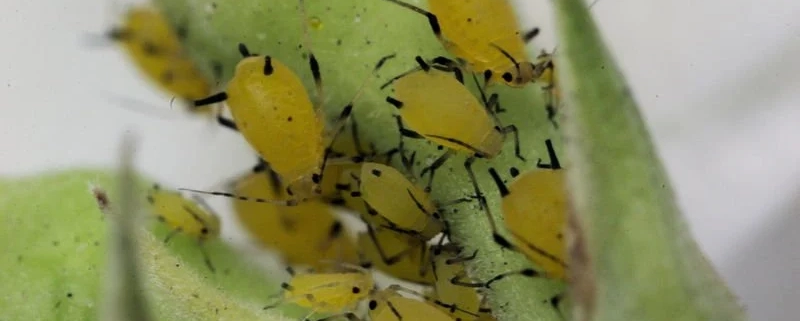Pest & Disease Control
Several types of pests and diseases can attack your plants. Look out for these physical changes by observing the plants closely. Pest attacks can generally be spotted by looking for leaf malformations / crinkling / holes and holes in vegetables or fruits. These typically tend to occur due to an increase in ant population near the crop. Diseases can be spotted by noticing physical symptoms such as wilting, yellowing of leaves, dryness in crop even after watering, leaf wrinkling, leaf rotting, coloured spots on leaves and leaf malformations.
Several home-made pesticides can keep away pests and help control disease. These include:
Neem oil: Neem oil is a good insecticide due to its bitter taste and strong odour yet it is non-toxic to animals, birds, plants and humans. It can be used as is or mixed with soap nut water and the solution can be sprayed on plants infested with pests. However, it is too strong when applied directly to plants and needs to be diluted with Soap Nut water. This is required as water and oil don’t mix. Point to note: do not spray directly on the shoot during summer, it builds up heat in the plant.
To make the Neem Oil mixture, dissolve 3 gms (3 pinches) of neem oil soap in 1 litre of water. Use this solution using a sprayer or apply using leaves over the plants to cover all parts of the plant.
Ginger, Garlic, Chilli Extract: A simple, natural pest repellent can be made at home using ginger, garlic, and green chillies. This extract is effective in repelling a variety of common garden pests and is ideal for home gardens. To prepare the solution, grind 25 grams of garlic, 12.5 grams of ginger, and 12.5 grams of green chillies into a fine paste. Mix all three pastes thoroughly in 700 ml of water and let it sit for an hour. Strain the mixture using a fine cloth or sieve to obtain a smooth extract. This will yield approximately 600 ml of concentrated solution. For use, dilute 50–100 ml of the extract in 1 litre of water and spray on affected plants, ensuring good coverage on leaves and stems. It’s best applied in the early morning or evening to avoid plant stress. The extract is most effective when freshly prepared but can be stored in a cool, shaded place for up to 3 days.
Eucalyptus oil: Eucalyptus oil has a potent odour which can keep away insects and bugs. It is also an effective agent against infestations by scale insects such as aphids, whiteflies and mites. For these pests, combine 1 teaspoon eucalyptus oil with 2 cups of soap nut water. Shake well in a spray bottle and apply to affected plants.
Chrysanthemum Flowers: These flowers have a powerful chemical compound called pyrethrum which is believed to damage the nervous system of insects and pests. Boil some flowers in a pan of water for about 20 minutes. Strain and add this to a spray bottle. This solution can be stored up to two months. In order to make it more effective, neem oil may be added to it.
Sour Curd: It is especially good to treat diseases, you can mix 300 ml of sour curd in 1 litre of water and use this to spray on the plant. This can be done so long as the problem is only due to diseases and not due to pests.
Marigold, Onion, Garlic, and Chives help in controlling aphids. Flowers in general, and Marigold in particular, are great plants to have in your garden as they helps prevent nematodes and attracts insects that eat less welcome pests.
Fennel seed (Perunjeeragam) and Cumin seed (Karunjeeragam) Powder: A natural way of keeping rodents away is by spreading Fennel and Cumin powder around plants. Bandicoots move on soil by repeatedly sniffing their way through and these strong spices enter their nostrils and deter them from finding and destroying plants.
Other Rodent Control Measures: Banana plants can attract snakes but they keep away rodents and therefore can act as biocontrol agents. A rodent mesh fence can also help barricade the entry of rats and bandicoots.
REFERENCES
Personal Conversation with Mrs. K. Parimala, Sempulam Sustainable Solutions Private Limited
https://food.ndtv.com/food-drinks/5-natural-pesticides-you-could-use-to-grow-your-own-kitchen-garden-1877271
https://homeguides.sfgate.com/eucalyptus-uses-getting-rid-pests-83027.html

